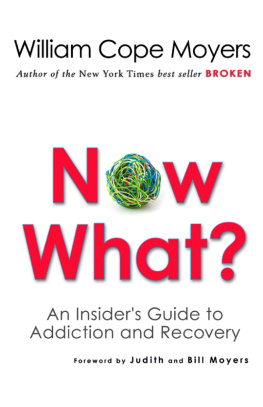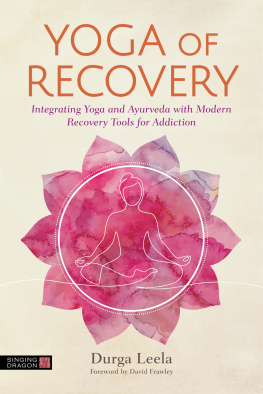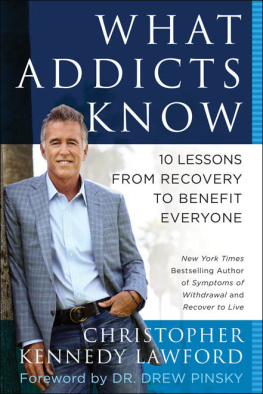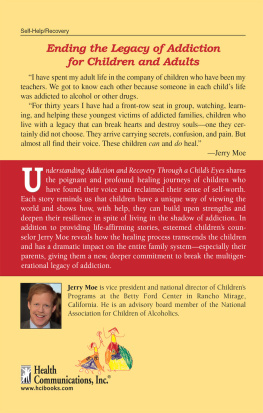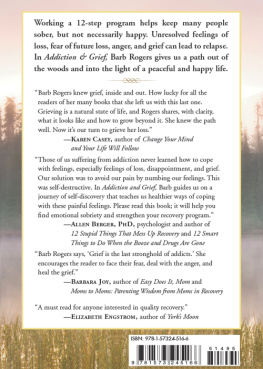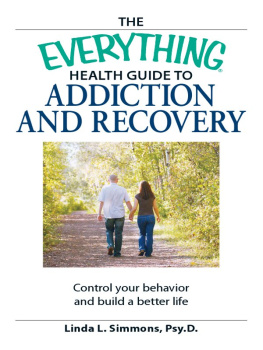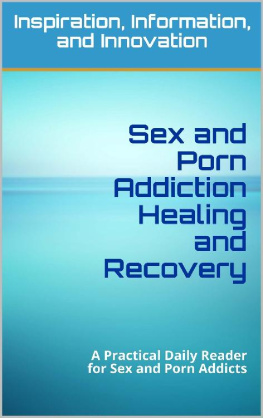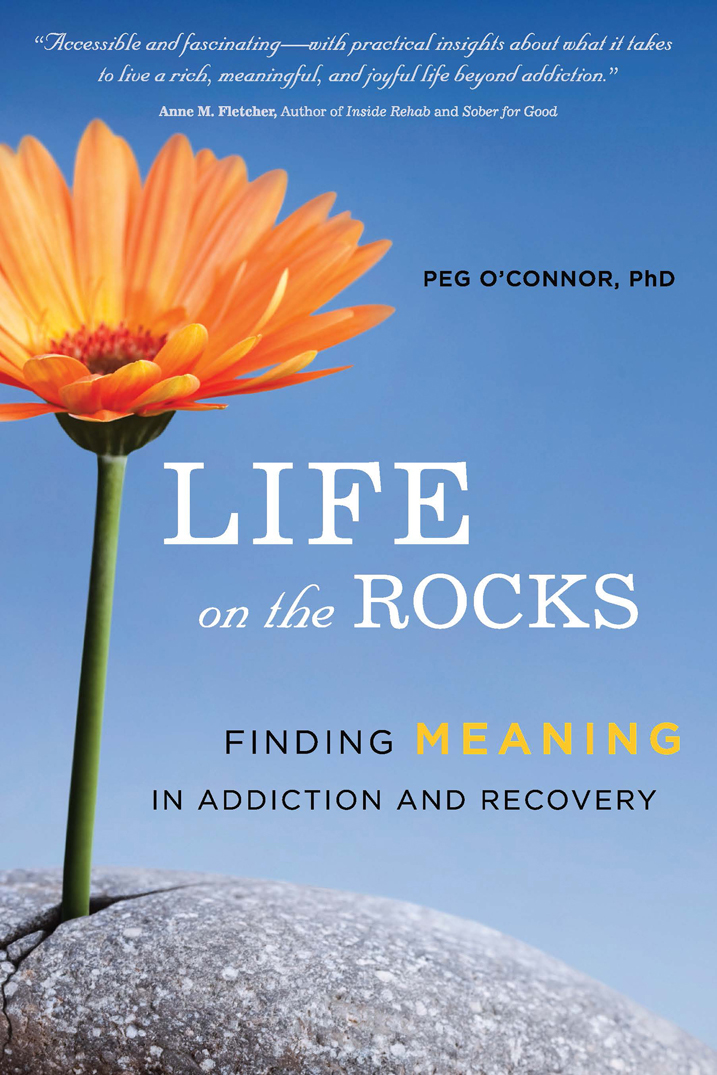Special Praise for Life on the Rocks
OConnor is a gifted writer who has a most unique take on addiction and recovery. She makes Life on the Rocks accessible and fascinating, using practical insightsnot only from the wisdom of philosophers but also from personal experienceto put a new spin on old clichs about what it takes to live a rich, meaningful, and joyful life beyond addiction.
Anne M. Fletcher
Author of Inside Rehab and Sober for Good
A wonderful, personal, lyrical book, reflecting on OConnors own alcoholism and what it has taught her about honesty, integrity, escapism, self-deception, trauma, and the meaning of life. OConnor accomplishes the feat of revealing the particulars of her own fascinating life [while creating] a conversation with Socrates, Plato, Aristotle, Kierkegaard, Wittgenstein and others. The book is a down to earth, non-dogmatic meditation on addiction, recovery, and the daunting project of living a good life without numbing ones mind.
Owen Flanagan
James B. Duke Professor of Philosophy at Duke University
Peg OConnor brings her training in philosophyand her passion for itto bear on the nature of addiction and, more importantly, recovery from it. Both addicts and philosophers will learn much from her book, as will those who are neither. Her creative use of Nietzsches notion of the Will to Power, which she distinguishes from willpower, points the way to a life not just lived, but lived well, which she, like Socrates, regards as the universal human goal.
Francis Seeburger
Emeritus Professor of Philosophy at the University of Denver and Author of Addiction and Responsibility
Part philosophical exploration of addiction and recovery, part personal sharing, and part search for sufferings deeper meaning, Life on the Rocks is a timely contribution to addiction studies. By emphasizing that addiction not only leads to suffering but is also caused by it, OConnor reveals just how transformative recovery from addiction truly is.
Dr. Nicholas Plants
Professor of Philosophy at Prince Georges Community College and Co-editor of Sobering Wisdom: Philosophical Explorations of Twelve-Step Spirituality
While science, psychology, and sociology have dominated discussion of recovery, philosophy has been largely silent. Now it finally has its say, as OConnor takes us back to the ancient Greek roots of philosophy as care for the soul. She not only illuminates the recovery process but also shows that philosophy is more than an academic subjectit is a way of life. Life in recovery is a quest for meaning, and philosophy is the ideal guide for the quest.
William Irwin, PhD
Herve A. LeBlanc Distinguished Service Professor of Philosophy at Kings College Wilkes-Barre, PA, and Editor of The Blackwell Philosophy and Pop Culture Series
Addiction treatment and academic philosophy are not glamorous fields, but OConnor puts them together effectively, generating new and fascinating therapeutic tools which address basic questions, such as Why live? OConnor demonstrates through personal experience and philosophical reasoning how what she teaches in the classroom can help the addict build a positive lifestyle in which psychoactive substances are no longer attractive.
John E. Burns, PhD
Founder of Vila Serena Treatment Centers, Brazil
Through a series of short reflections that draw upon the work of our great philosophers, Life on the Rocks offers helpful, illuminating insights into the experience of addiction and recovery. Peg OConnor explores the moral import of addiction without ever moralizing. She keeps her thinking close to life and far away from pretension, using accessible language to convey truths that our rationalizations keep hidden from us. Shes a philosopher with whom Socrates would have enjoyed conversing.
Jerome A. Miller
Co-editor of Sobering Wisdom: Philosophical Explorations of Twelve-Step Spirituality
LIFE ON THE ROCKS

Central Recovery Press (CRP) is committed to publishing exceptional materials addressing addiction treatment, recovery, and behavioral healthcare topics.
For more information, visit www.centralrecoverypress.com.
2016 by Peg OConnor
All rights reserved. Published 2016.
No part of this publication may be reproduced, stored in a retrieval system, or transmitted in any form or by any means, electronic, mechanical, photocopying, recording, or otherwise, without the written permission of the publisher.
Publisher: Central Recovery Press
3321 N. Buffalo Drive
Las Vegas, NV 89129
21 20 19 18 17 16 1 2 3 4 5
Library of Congress Cataloging-in-Publication Data
Names: OConnor, Peg, 1965
Title: Life on the rocks: finding meaning in addiction and recovery / Peg OConnor.
Description: Las Vegas: Central Recovery Press, 2016. | Includes bibliographical references.
Identifiers: LCCN 2015036173| ISBN 9781942094036 (ebook)
Subjects: LCSH: Substance abuse--Patients--Rehabilitation. | Substance abuse--Psychological aspects. | Addicts--Behavior modification.
Classification: LCC RC564 .O28 2016 | DDC 362.29--dc23
LC record available at http://lccn.loc.gov/2015036173
Photo of Peg OConnor by Steven Yang. Used with permission.
Early versions of Chapters Two, Five, and Twenty were first published in the New York Times (titled In the Cave: Philosophy and Addiction, The Fallacy of the Hijacked Brain, and The Light at the End of Suffering, respectively). Reprinted here with permission.
Every attempt has been made to contact copyright holders. If copyright holders have not been properly acknowledged please contact us. Central Recovery Press will be happy to rectify the omission in future printings of this book.
Publishers Note:
This book contains general information about addiction, addiction recovery, and related matters. The information is not medical advice. This book is not an alternative to medical advice from your doctor or other professional healthcare provider.
Our books represent the experiences and opinions of their authors only. Every effort has been made to ensure that events, institutions, and statistics presented in our books as facts are accurate and up-to-date. To protect their privacy, the names of some of the people, places, and institutions in this book may have been changed.
Cover and interior design and layout by Sara Streifel, Think Creative Design
To my parents, Ann and Jack, for always giving me your blessing and support to become whatever the hell I want to be.
The greatest hazard of all, losing the self, can occur very quietly in the world, as if it were nothing at all. No other loss can occur so quietly; any lossan arm, a leg, five dollars, a wife, etc.is sure to be noticed.
Sren Kierkegaard, The Sickness Unto Death
Table of Contents
Guide
TABLE OF CONTENTS
THE IMAGE OF AN AUTHOR SCRIBBLING AWAY IN SOLITUDE DOESNT fit me; writing this book has been a very social and fun enterprise. My friends and family have provided enormous emotional support, intellectual challenge, and gales of laughter. I am evidence of a central theme in this bookthe right friends make us better people.
A few friends deserve special mention because I would often bounce ideas off them, and they would happily play along. Mary Beth, Cathy, Sheri, Patty, and Mary are my recovery posse. They would dive into a pig pile to rescue me. In fact, they would do it in great style.


